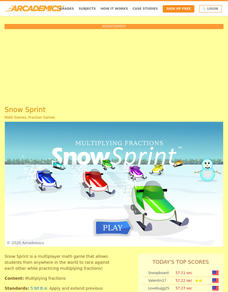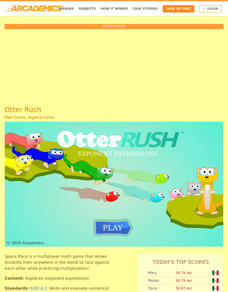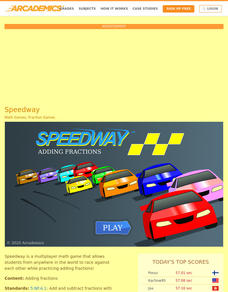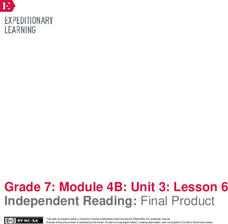Arcademics
Puppy Chase
Chase down fraction to decimals conversions. Players convert fractions to decimals to run a race as a puppy. Correct answers boost the speed of their game pieces. Each race allows up to 12 players to race against each other in the online...
Arcademics
Dirt Bike Comparing Fractions
Players push and pull their way to understanding fractions. Users play against one another or the computer in an online tug-of-war game to compare fractions. Learners choose the correct symbol to compare two fractions. Each correct...
Arcademics
Ratio Stadium
Bike to master ratio basics. Learners propel their motorbikes around the track by identifying equivalent ratios. Each correct response provides a boost to the bike, while incorrect answers slow it down.
Arcademics
Snow Sprint
Dash through the snow with fractions. Players race snowmobiles while multiplying fractions. By choosing the correct products, learners make their online game pieces move around the track. The faster the correct answer, the quicker the...
Arcademics
Otter Rush
Otters help learners increase fluency with exponents. Given four options, pupils determine which one would make a given equation involving exponents true. The faster individuals answer, the faster their otter races around the track in...
Arcademics
Speedway
Race to extreme fluency. Scholars play a car race online game where the faster they choose the answer to fraction addition and subtraction problems, the faster their cars go. Pupils play against the computer or other players online....
NASA
Designing and Building the Lunar Plant Growth Chamber
Build a place for the plants. Using information learned from the previous lesson in the unit, learners design a lunar plant growth chamber and build a paper model of it. Given strips of paper that represent different sizes of planting...
NASA
Providing Light for Your Plants
Using a guided lesson, pupils learn about what it takes to make a circuit along with a switch. They build a complete circuit under the direction from the teacher and identify each of the elements of the circuit. Scholars then learn to...
EngageNY
Connecting Literary and Informational Texts: Cronus and “The Key Elements of Mythology”
Is there a connection? Scholars work to make connections between Myth of Cronus and The Key Elements of Mythology. First, they circle important words in the text and look for similarities. They then revisit the concept of theme and...
EngageNY
Reading Closely to Build Background Knowledge: “Myths and Legends”
That is a myth! Scholars take a look at Greek myths referenced in The Lightning Thief. As learners listen to stories in Myths and Legends, they imagine the sights and sounds described. Pupils then talk with partners about specific words...
EngageNY
End of Unit 1 Assessment: Drawing Evidence from Text: Written Analysis of How Percy’s Experiences Align with “The Hero’s Journey”
Do your best on the test! Readers finish up by completing the end of the unit assessment. Using the assessment, writers describe how Percy's experiences in The Lightning Thief align to four parts of The Hero's Journey. After completing...
EngageNY
Writing with Evidence: Percy and the Hero’s Journey (Chapter 7)
Read, set, write! Scholars participate in the first fully independent writing task of the unit as they write about how Percy’s experience in The Lightning Thief aligns with The Hero’s Journey. To begin their writing, they complete a...
EngageNY
Selecting Evidence: “The Hero’s Journey” and The Lightning Thief (Chapter 6)
Take a closer look. Scholars learn how to read closely using chapter six in The Lightning Thief. While reading, they write the gist of paragraphs on sticky notes and stick them in the book. They then answer text-dependent questions over...
EngageNY
The Hero’s Journey, Part 1: What is a Hero?
That was heroic! Scholars quickly look over What is a Hero to determine and discuss the structure of the text. They then read the introduction and Act 1 closely to find the gist and annotate the text. They circle unfamiliar words and...
EngageNY
Mid-Unit 1 Assessment: Making Inferences from Percy
Time to shine! Scholars show everything that they have learned so far in the unit by completing a mid-unit assessment. In the assessment, they discuss the gist of sections of text from The Lightning Thief and inferences they made about...
EngageNY
End of Unit Assessment, Part 1, Continued: Revising Vocabulary and Conventions based on Feedback
Howdy, partner! Scholars partner up to look at the last two rows in the writing rubric. After discussing the details in the rubric about organization and conventions, learners use colored writing tools to circle feedback in their...
EngageNY
Independent Reading: Final Product
Cheater, cheater. Learners create cheat sheets about their independent reading books to help others determine if the text interests them. After creating drafts of their sheets, scholars pair up for a peer review and then complete a final...
News Literacy Project
News Judges
Order in the court! Scholars act as news judges, learning how to analyze the newsworthiness of several pieces of information. Working in small groups, they determine which events are most newsworthy and then complete graphic organizers...
EngageNY
Using Multimedia in Presentations: Presenting Claims
Visuals help clarify claims. Scholars create visual displays to accompany their end-of-unit presentations about water sustainability. Using blank paper and their notes from the unit, they put their creativity to good use and then...
EngageNY
End of Unit 2 Assessment, Part 1B: Fishbowl on Better Use of Water in Industry
Listen up, it's time for a Fishbowl discussion! Scholars continue their discussions about water management in industry and agriculture. After hearing both sides of the debate, pupils complete graphic organizers, deciding which sector is...
EngageNY
End of Unit 2 Assessment, Part 1A: Fishbowl on Better Use of Water in Agriculture
Just keep swimming! Pupils participate in a Fishbowl discussion, sitting in two concentric circles and alternating between speaking and listening roles. During the discussion, they defend a claim about the best way to begin managing...
EngageNY
Forming a Research-Based Claim: Stakeholder Chart on Better Agricultural Water Management
How can industries manage water more sustainably? Building on the previous activity, scholars explore the topic by creating a stakeholder chart for agricultural water management. Next, they participate in the World Café discussion...
EngageNY
Forming a Research-Based Claim: Stakeholder Chart on Better Industrial Water Management
It's time to stake a claim! Working with partners, scholars create stakeholder charts for better industrial management of water. As they complete the chart, pupils consider an option for managing water more sustainably, identify...
EngageNY
Forming a Research-Based Claim: Cascading Consequences Charts
Life is all about choices and consequences. Using a Cascading Consequences chart, scholars create a visual map of the effects of a particular choice or action related to water management. With their researcher's notebooks and copies of...

























